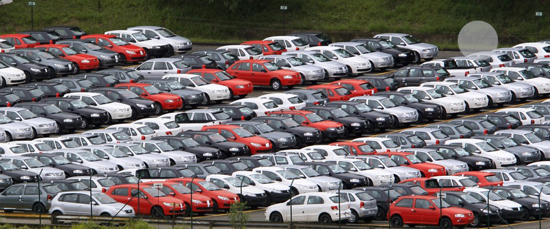U.S. Auto Sales Expected to Rise
Tim Esterdahl | Sep 03, 2012 | Comments 4
Three major automotive indicators all agree, U.S. auto sales should see double-digit gains in August. The gains are going to be led by Toyota’s and Honda’s resurgence and more fuel-efficient car sales.

Three big automotive indicators expect light-duty car sales to rise by double-digits in August, 2012.
According to a story in the Detroit News, TrueCar.com, J.D. Power & Associates and Kelley Blue Book expect light-vehicle sales to rise between 16 and 19 percent. For the month, total light-vehicle says should top 1.25 million. This sales volume should boost annual sales to around 14.2 million, up 14.1 million.
“The strength in August light-vehicle sales takes some of the pressure off expectations for the balance of the year, but a high level of risk lingers,” Jeff Schuster, senior vice president of forecasting at LMC Automotive, said in a statement. “We expect the current seesawing in auto sales to continue for the foreseeable future, but the overall picture in 2012 remains positive.”
This news coincides with other economic indicators that say the economy is growing. For the first time since June, 2010, home values and home sales are on the rise. These indicators often correlate with automotive sales. Plus, recent reports say that the economy has grown 1.7 percent so far this year.
As expected, both Toyota and Honda are expected to have over inflated gains versus 2011 when both were experiencing parts and inventory shortages. With more inventory in stock and a re-surging economy, both automakers are seeing a boom in total sales.
With fuel-efficient vehicles leading the way, trucks sales will probably see a marginal increase. The reality is that for full-size trucks sales to boom, they simply have to offer more mpgs probably through some type of hybrid engine combination.
Unfortunately for consumers, more vehicle sales mean less incentives. Who is impacted more by less incentives? The Ford F-150, Dodge Ram, Chevy Silverado or Toyota Tundra? What do you think?
Related Posts:
- New 2013 Toyota Tundra Pricing Available
- U.S. Finalizes Higher 2025 Fuel Economy Standards
- Higher Fuel Efficiency = Higher Taxes
Search terms people used to find this page:
- tundraheadquarters
Filed Under: Auto News


Toyota would be hurt the most. Toyota don’t like to put incentives out there like the Big 3. That shows the big 3 has over priced vehicles to start off with.
Sorry about that. I’m on a new computer. My statement above.
The big 3 has always had huge incentives and will continue to in order to sell their trucks. I do believe the markup on the Big 3 from msrp to dealer invoice is also greater, but not as much as in years past.
Toyota will gain a smidge if the rebates go down since more people will tend to then go look at a tundra if the rebates are more closely matched and even, but that won’t ever happen since the Big 3 always have greater incentives than toyota and always will have.
I would have to agree Toyota would be hurt the most.